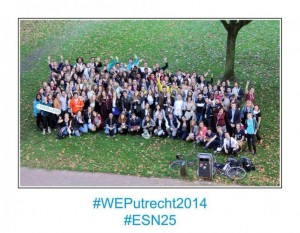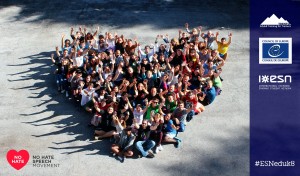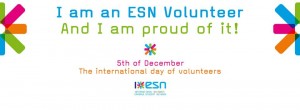Challenges
 It often happens to me that the answers to my most pressing questions are actually right under my nose. This was the case for my research project as well. After a series of unfortunate events, I decided to give up the placement at the Romanian embassy and go for a full year at the University of Potsdam. However, this meant I would no longer be able to pursue my initial research idea, as I had no clue where to find subject participants, how to go about doing research and overall – how to start all of this? A newbie in a yet another foreign country, difficulties with the language, and on top of everything the challenge of having to start over thinking about a new YARP…
It often happens to me that the answers to my most pressing questions are actually right under my nose. This was the case for my research project as well. After a series of unfortunate events, I decided to give up the placement at the Romanian embassy and go for a full year at the University of Potsdam. However, this meant I would no longer be able to pursue my initial research idea, as I had no clue where to find subject participants, how to go about doing research and overall – how to start all of this? A newbie in a yet another foreign country, difficulties with the language, and on top of everything the challenge of having to start over thinking about a new YARP…
So where could I find subject participants, research something original that I was fascinated in, while at the same time assuring a balance in my life? The answer was quite clear – I will focus my project on the volunteer work I do for the Erasmus Student Network. Beginning with July, I have started being the Vice Chair for the International Committee for Education of the Erasmus Student Network (ESN) International and since then learned quite a lot in terms of promoting student mobility, advocating for better education policies on a European level and assuring that the voices of young, mobile people are being heard by important European stakeholders…I’ve been travelling at least once per month for conferences and international events and got the chance to meet so many young, intelligent, mobile people from all over Europe. Furthermore, with 2014 being such a profoundly celebratory year – 25 years since the fall of the Berlin wall, 25 years celebration of ESN and for me personally 25 years since the Romanian Revolution – I felt the urge to explore the meaningful topic of European identity.
It is rather fascinating how quickly and completely this organisation can foster a sense of community and togetherness and never in my life have I ever been exposed to such an environment where there are at least 3-4 languages spoken in your surroundings and everybody has the same sort of mindset and the same passion for education, mobility and Europe…If you want to have a small insight into this, watch this video, it is one of the best descriptions…But there are a few questions that made me think:
– Do we all understand the same thing when we identify ourselves with Europe? How do we define European Identity and should I provide different definitions of it, would there be an overall agreement on one particular definition?
– Are we all united in diversity, as Europe imagines us, or are we in the end just the young version of “European elites” that have had the access to this type of living, but not necessarily represent Europe? I surely hope it is not so, but I think it would be worth having look at this. If this is not true, what then stimulates us so much into claiming we are European and acting on it at the same time? Is there any particular pattern which could be investigated and put forward in order to stimulate and promote a better understanding of European identity and a better identification with Europe for other groups of young people?
– Thirdly, leaving myself out of the discussion, although I find it rather hard not to identify myself as a member of this organisation, what are the drivers of this organisation? How does the sort of “inside politics” of this organisation affect its members? Is this more of a political/social/cultural/educational organisation? Does this matter in the context of forming a European identity?
– What is the role of language in all of this – in terms of language diversity, but also use of language, by which I mean quite often inspiring discourses about what it means to be a volunteer/an Erasmus student/a European.
These are all questions that came up after closely observing this organisation and having quite a lot of discussions with its members. I will further on try to implement my strategies in order to actually get concrete answers to these questions, which I assume will be more challenging than I previously thought it would because of two main reasons:
– It appears that ESNers are actually quite reluctant to including your own research projects into the events’ agenda, as it would take time out of the important issues that have to be discussed about the network, which means that I will need to find other ways to do my research by avoiding using time out of plenaries…
– Fear of getting standardised answers – these people know how to talk and they would talk for hours and in 2-3 different languages if you let them (I know that, I am one of those them), but I need to be able to extract meaningful information from them.
Off to my new challenge – the Council of National Delegates meeting in Vilnius for ESN. Will be reporting more from that event. And here is an article on one of my latest ESN events I produced for ESN UK.




Leave a Reply